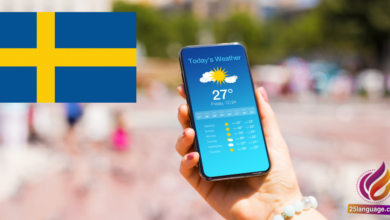Phrases about the days of the week in Swedish
Learn Swedish

: The importance of days of the week
The days of the week hold significant importance in structuring our lives and providing a rhythm to our routines. Here are several reasons why the days of the week are important:
- Organization and Planning: The days of the week provide a framework for organizing and planning our activities. By dividing time into distinct units, we can schedule appointments, deadlines, and commitments effectively. This organization helps us manage our time efficiently and avoid conflicts.
- Work and Productivity: For many people, the days of the week delineate the workweek, with weekdays designated for work and weekends for rest and leisure. This division helps maintain a balance between professional responsibilities and personal well-being, contributing to overall productivity and satisfaction.
- Routine and Structure: The days of the week establish a sense of routine and structure in our lives. Regular activities such as going to work or school, attending appointments, and participating in recreational pursuits often occur on specific days, providing a predictable pattern to our days.
- Social and Community Engagement: Certain days of the week are associated with social and community activities, such as gatherings with friends or family, religious observances, or volunteering opportunities. These interactions foster social connections, support networks, and a sense of belonging.
- Health and Well-being: The days of the week influence our health and well-being by shaping our habits and behaviors. Weekdays may be dedicated to work or exercise routines, while weekends offer opportunities for relaxation, recreation, and self-care. Balancing these activities promotes physical and mental health.
- Cultural and Religious Significance: In many cultures and religions, specific days of the week hold religious or cultural significance. For example, Sunday is observed as a day of worship in Christianity, while Friday holds special importance in Islam. These designated days provide opportunities for spiritual reflection and observance.
- Economic Impact: The days of the week can have a significant economic impact, particularly in industries such as retail, hospitality, and entertainment. Businesses may adjust their operations and marketing strategies based on consumer behavior and spending patterns throughout the week.
- Reflection and Planning: The beginning and end of the week serve as natural points for reflection and planning. On Mondays, we may set goals and intentions for the week ahead, while Fridays offer an opportunity to review accomplishments and prepare for the weekend.
In summary, the days of the week play a multifaceted role in our lives, influencing our schedules, routines, social interactions, and overall well-being. By recognizing the importance of these divisions of time, we can make the most of each day and create a fulfilling and balanced lifestyle.
: Expressions about the days of the week
Here are some important sentences about days of the week with translations
| English | Swedish |
|---|---|
| Monday is the first day of the workweek. | Måndag är den första dagen på arbetsveckan. |
| Tuesday follows Monday in the week. | Tisdag följer måndag i veckan. |
| Wednesday is often referred to as “hump day.” | Onsdag kallas ofta för “mitt-i-veckan”. |
| Thursday is sometimes called “little Friday.” | Torsdag kallas ibland för “lilla fredag”. |
| Friday is everyone’s favorite day of the week. | Fredag är allas favoritdag i veckan. |
| Saturday is a day for relaxation and leisure. | Lördag är en dag för avkoppling och fritid. |
| Sunday marks the end of the week for many. | Söndag markerar veckans slut för många. |
| The weekdays are Monday through Friday. | Vardagarna är måndag till fredag. |
| Weekends are typically Saturday and Sunday. | Helger är vanligtvis lördag och söndag. |
| Some cultures observe different weekend days. | Vissa kulturer observerar olika helgdagar. |
| Monday mornings can be challenging for some. | Måndagsmorgnar kan vara utmanande för vissa. |
| Wednesday evenings are often mid-week breaks. | Onsdagskvällar är ofta mitt-i-veckan-pauser. |
| Friday nights are popular for social gatherings. | Fredagskvällar är populära för sociala sammankomster. |
| Many people look forward to lazy Sundays. | Många längtar efter lata söndagar. |
| Weekdays are typically busy with work or school. | Vardagar är vanligtvis upptagna med arbete eller skola. |
| Saturday mornings are often reserved for errands. | Lördagsmorgnar är ofta reserverade för ärenden. |
| Sunday evenings are a time for relaxation. | Söndagskvällar är en tid för avkoppling. |
| Thursday afternoons can be a slump for productivity. | Torsdagseftermiddagar kan vara en nedgång för produktiviteten. |
| Wednesday mornings often call for coffee. | Onsdagsmorgnar kräver ofta kaffe. |
| Saturdays are for adventures and exploration. | Lördagar är för äventyr och utforskning. |





























